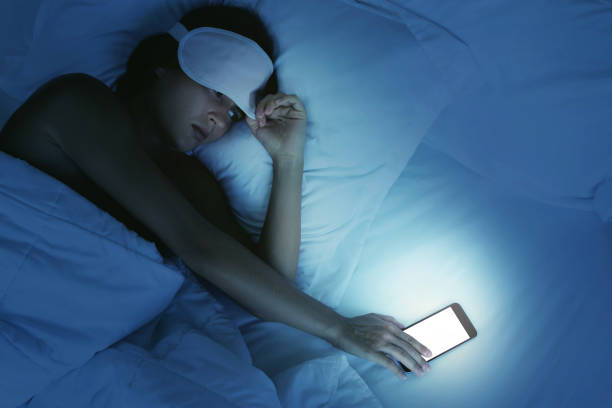
If you ask most people, they will say they know the importance of getting a good night’s sleep. Unfortunately, that knowledge doesn’t always equate to feeling like you can make enough time to get the hours of sleep you might want and/or need. In fact, you may even resist going to sleep as the evening winds down.
Do you feel like you have endless responsibilities, deadlines, and obligations? Is it hard to find time for yourself? Do you find solace in the late hours of the night? Do you stay up later than you plan, conscious of the fact that you intended to go to sleep earlier and can’t seem to make yourself break the habit? If so, you may have Revenge Bedtime Procrastination!
What is Revenge Bedtime Procrastination?
Revenge Bedtime Procrastination has become known as a rebellious act of defiance against the scarcity of personal time during the day. Let’s uncover and unpack the intriguing late-night rebellion that has captivated the attention of the sleep-deprived masses, both the downsides and how you can break the habit.
What are the Results of Poor Sleep Hygiene?
Daytime Fatigue:Insufficient sleep can lead to excessive daytime sleepiness, making it challenging to concentrate, perform tasks efficiently, and maintain optimal cognitive function.

- Impaired Mental Health:
Poor sleep hygiene has been linked to an increased risk of developing mental health disorders such as depression, anxiety, and mood disorders.
- Weakened Immune System:
Inadequate sleep can weaken immune function, making individuals more susceptible to infections, viruses, and other illnesses.
- Impaired Memory and Learning:
Lack of quality sleep can impair memory formation, attention span, concentration, and learning abilities.
- Poor Emotional Well-being:
Lack of sleep can contribute to irritability, mood swings, increased stress levels, and reduced ability to cope with daily challenges.
5 Steps to Beating Revenge Bedtime Procrastination
1) Set Clear Boundaries:

Boundaries center around behaviors; as a CBT therapist (Cognitive Behavioral Therapy), I see how thoughts, behavior, and feelings all impact one another. Thoughts become feelings, which impact behaviors, which affect our thoughts, and it goes on and on. A boundary gives you a tool to intercept runaway trains, avoid spiraling, and reset when you do experience a stumbling block of some sort.
Establish a firm schedule for your bedtime and stick to it. Determine a reasonable time to wind down and start your bedtime routine, allowing yourself enough time to relax and prepare for sleep. When doing this, look at your current schedule logically and realistically. This includes looking at your bedtime routine and predicted hours of sleep, but also how much you are taking on during the day, week, month, and year.
Like all boundaries, the rules you create around your waking and sleeping schedule are rules for yourself. This means you only hurt yourself when you bend or break them. There will always be times when you are tempted to stay up late: special events or extraordinary circumstances will occur in your lifetime. A boundary lets you choose your plan most of the time so that those rare occurrences don’t become a habit or pattern.
An important boundary to have is an agreement with yourself about what time you are going to wake up in the morning. A morning routine is part of a sleep routine; if you wake up at the same time every day, you will be more likely to feel tired around the same time at night. It’s very tempting to set your alarm for an hour later if you stay up too late, but what happens if you stay up a little later again the next night as a result? If you keep nudging your bedtime later and your wake-up time later, then the cycle not only continues but it likely worsens.
2) Prioritize Self-Care and Relaxation:
Don’t wait until the end of the day to do what it takes to have a good sleep. Throughout your day, you will be faced with choices, such as when to stop consuming caffeine (if you do), whether or not to move your body in a

way that feels good, what kinds of foods to eat, and when. You may want to reduce your caffeine intake and/or move it earlier in the day. You may find that moving your body helps you clear your mind and burn off any excess energy and/or anxiety; how can you make that happen for yourself on a regular basis? You might notice patterns with food: if you don’t eat enough before bed or eat too much, you might be disrupted by the discomfort of hunger or fullness. Going to sleep, you should feel satisfied in as many ways as possible. By prioritizing self-care, you can identify and adjust your patterns as needed.
Where do you make time for self-care and relaxation throughout your day? As an anxiety therapist in Woodland Hills, I see many people who benefit from having self-care rituals in place. These can be ways to start your day off right, coping skills for stressors, boundaries that facilitate happiness and peace, and/or all of the above. What happens to you throughout the day impacts how you transition to bedtime. If you have unresolved emotions, you can find them hitting you as soon as you pause – as in, the moment your head finally hits the pillow and you’re alone with your thoughts.
When it comes to winding down, empower yourself. Create a nighttime routine that promotes relaxation and prepares your body and mind for sleep. Many people have returned to physical books instead of e-books to reduce the glow of electronics. Some people enjoy a bath or guided meditation. Some people find that a few laps around the block help burn off any excess energy.
3) Manage Stress and Overcommitment:

This is a big one. Identify and address the underlying causes of your revenge bedtime procrastination. What satisfaction are you still seeking from your day? Is it alone time, time to decompress, or time to learn something new? If you find yourself using late-night hours as a way to regain control or reclaim personal time, explore strategies to manage your daily stress and responsibilities more effectively.
You may think this is easier said than done, and in some ways, that’s true. It takes mental energy and planning to make and/or change habits. How you manage stress and your schedule is also personal to you; some people have more flexibility than others. The way to combat this is to prioritize based on what is inflexible and build your routine around that.
Determining your priorities is easier when you align your intentions with your values. This means that if you make a list of your values, and your wellness isn’t at the top, you’ve got a place to start. No matter how many people are counting on you, you should always be your priority. You are your constant companion, and only when you are well can you truly show up for others the way you want to.
This process often involves compromise. For example, if you have children, your instinct might be to put them first all of the time. However, you will burn yourself out living like this; your job is to determine where you must come first so they can benefit from your care and attention. Will you always be able to put yourself first? Of course not. Emergencies happen, and special circumstances happen. But if you have the intention of self-care, you will work toward it. Over time, it becomes a habit.
Seek to carve out personal time, including stress relief time, every day. Once you’re able to do that, see if you can make it twice per day. And work up from there.
4) Establish a Sleep-Friendly Environment:
Create a sleep environment that promotes relaxation and tranquility. Ensure your bedroom is dark, quiet, and at a comfortable temperature. Consider all your senses when you think about creating this environment, not just

what you can see and hear. Are there smells that soothe you? How does your bedding feel when you are nestled in it?
Are you trying to sleep somewhere where other people go through or sharing a wall with noisy neighbors? Can you move your bed to a different wall, or consider some boundaries to set for foot traffic? Even if wall-sharing isn’t a concern, rearranging your furniture might create a space that makes you feel more peaceful. You may have children who get up in the middle of the night; how can you create a sleep routine for them that allows you to have peace most of the time?
When you look at your sleep-friendly environment, you may have to break it down into top priorities. For example, blackout curtains might be number one on your wishlist if your room is very bright. What if you can’t afford them, or they’re not in stock right now? A sleep mask can take some getting used to, but it works as an option if you cannot physically make your room darker. You might want blackout curtains, a new mattress, new bedding, a diffuser to fill the air with a soothing smell, and more. Begin to cultivate your room in feasible pieces. All the changes in the world won’t undo the stress of maxing out your credit cards.
Is your bed a place where you want to be? Does it make you feel cozy and relaxed, and safe? Do you share your bed with a good sleep companion? If you and the person you sleep next to aren’t on the same page about bedtime, bedding, electronics, etc., you will have to find compromises that work for both of you. Remember to approach that conversation from a problem-solving perspective, not an accusatory one.
5) Practice Good Sleep Hygiene Habits:

Incorporate healthy sleep habits into your daily routine. This includes avoiding caffeine and heavy meals close to bedtime, engaging in regular physical activity earlier in the day, and limiting daytime napping. Sleep Hygiene is getting harder and harder to maintain as we spend more time running around, utilizing technology, existing in artificial environments, working longer hours and late-night shifts, and more. Long gone are the days of waking with the sun and going to bed with the moon.
When we look at sleep hygiene, we zero in on the sleep environment. Experts suggest that your bed shouldn’t be where you watch television, work on projects, or do anything except sleep. When you disconnect from technology and focus on getting rest, you train yourself that your bed = time to sleep. This becomes a subconscious association that can make it easier and faster to fall asleep when the time comes.
Outside of your sleep environment, focus on factors you can control. How much caffeine are you consuming during the day; until what time? Are you eating heavy meals before bed? Are you going to bed hungry? What is your sleep routine? Having a sleep routine is a great way to train your brain that sleep is approaching. If you always shut down your home, change into your pajamas, brush and floss your teeth, etc., in the same order, your body will begin to prepare for sleep as you go through these familiar actions.
What is on your mind before bed? How can you calm yourself? Many apps offer meditations to listen to; some are to decompress throughout the day, and others are for bedtime. Are you worried about your to-do list? If your concern is that you’ll forget something, take some time before bed to write it down and review it so that you know you’ll be able to tackle it tomorrow. Are your emotions running high? Journal about your day, either writing as a stream-of-consciousness, using prompts, or anywhere in between.
Like all habits, sleep hygiene habits don’t suddenly transition all at once. It takes time and patience to shift your lifestyle and make a lasting change. You might want to start with smaller pieces of the puzzle or make smaller changes to the big pieces. As long as you are working toward a healthy sleep hygiene routine with consistency and patience, you will experience improvements!
Revenge Bedtime Procrastination can impact people at any age, for a long time, or an acute period. In my work as a psychologist in Woodland Hills, I have met people who realize as adults that they’ve been delaying sleep for as long as they can remember. It is also a behavior that can occur out of seemingly nowhere. Taking time to understand which aspects of your life are causing you to feel the need for time for yourself late at night will help you to begin to change your thoughts and patterns. Any steps you make in the direction of getting better sleep will be positive ones. Always remember that you are deserving of personal time. You are deserving of self-care, of rest, of mental space, of fun, of relaxation. And you deserve to have those things and get a full night’s sleep.
ADHD Treatment for Adults at Embracing You Therapy
ADHD symptoms aren’t just about inattention or hyperactivity. It can show up in how you handle your routine, specifically morning and bedtime. If you feel like Bedtime procrastination might be a symptom of your ADHD, our trained therapists in our Woodland Hills office are here to provide ADHD Treatment. Not only will you learn to manage your ADHD symptoms, but you will also learn to thrive and live a life you feel proud of. Contact us today for your complimentary 20-minute phone consultation with our Client Care Coordinator.




